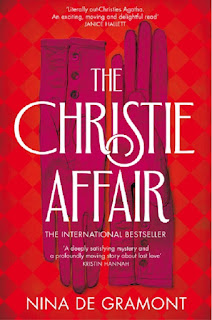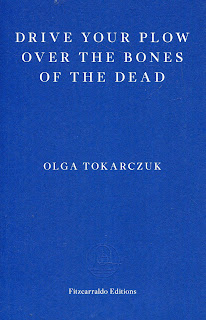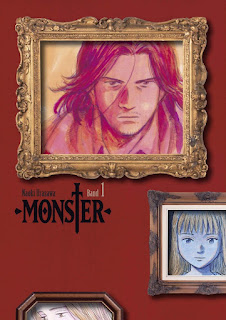At the end of every year, we ask readers to submit a micro-review of a favourite book from the last twelve months. The book can be from any time or genre - the only qualification is that it has to be a book the reader found particularly memorable, striking or enjoyable during the previous year. Here are the responses for 2022. Everybody's Reviewing wishes all its readers a happy new year of reading in 2023!
Kirsten Arcadio
Gabrielle Zevin, Tomorrow, and Tomorrow, and Tomorrow: "A novel after my own heart, Tomorrow, and Tomorrow, and Tomorrow by Gabrielle Zevin takes us through the story of Sam and Sadie, a pair of gamers and later, hugely successful tech creatives. Tomorrow is a kind of love story, the writing as fluid and flexible as the series of games created by the protagonists that string each scene of the novel together. More than that, it’s a reflection on the human condition and its transit through many reincarnations, both real and virtual. I’m left with a sense that there’s always a Tomorrow, a chance to walk away from Game Over and start afresh."
Joe Bedford
Olga Tokarczuk, Drive Your Plow Over the Bones of the Dead: "At 268 pages, Olga Tokarczuk's lyrical yet brutal Drive Your Plow Over the Bones of the Dead (translated by Antonia Lloyd-Jones) must be the longest novel I've read in a single sitting. The Nobel Prize-winner's exploration of animal ethics and Blakean spirituality within a classic whodunit structure is a masterclass in how novelists can interrogate the very depths of the human condition while still delivering an inescapable page-turner."
Kathleen Bell
Barbara Kingsolver, Demon Copperhead: "It's been a great year for books, largely thanks to public libraries and their wonderful librarians. I would never have bought Barbara Kingsolver's Demon Copperhead in hardback, however much I wanted to read it, but the library loaned me a copy almost as soon as it came out - and once I'd started on the first page I couldn't put it down. I don't suppose I'll ever know how she achieved such a compelling voice in this reworking of David Copperfield but it was vital to the way the novel as a whole undermines some of the most deeply embedded class assumptions in the USA. Read it! Had it not been for Demon Copperhead I would probably have chosen the non-fiction book by Thomas Harding, White Debt: The Demerara Uprising and Britain's Legacy of Slavery or opted for a tie between two of the poetry collections I'm currently reading: A Little Resurrection by Selina Nwulu and Manorism by Yomi Sode. All these are well worth reading."
Laura Besley
Charlotte McConaghy, Migrations: "Migrations is a cli-fi novel about Franny Stone, a woman in her mid-thirties who decides to track the last remaining Arctic terns on their pole-to-pole migration. Offsetting the harshness of the setting and circumstances is McConaghy’s lyrical evocative language. This is a beautiful and engaging read."
Laurie Cusack
John Fante, Ask the Dust "is a timeless, corking text that’s set in 1930s Los Angeles. It’s a superb portrait of a young budding down-at-heel wordsmith: Arturo Bandini. Young Bandini’s all-consuming ambition and his rites of passage are tough, hilarious and often bittersweet are laid bare in elegant fashion. Shout Fante’s dynamite refrain from every rooftop: 'I am Arturo Bandini.'"
Andrew Dix
Robert Macfarlane, Landmarks: "I came to this book belatedly, but loved its verbal richness. Macfarlane reads a peat bog or the face of a mountain as sensitively as he does the contours of a text. On, or down, to Macfarlane's Underland in 2023!"
Charlie Hill
Gwendolyn Brooks, Maud Martha: "Gwendolyn Brooks was the first African American to win a Pulitzer Prize. I'd never heard of her. This is an absolute joy: lyrical, unsentimental, and very modern."
Joe Joyce
Michelle Zauner, Crying in H Mart: "This book explored Zauner’s grief and life in such a well observed and musical way that I really connected to. She writes about loss so openly and honestly and lets her memories take the main focus."
Isabelle Kenyon
Imbolo Mbue, Behold the Dreamers: "Jenga and wife Neni don't have parental approval for their marriage, but they do have a shared dream of moving to New York. They find out the American dream is harsh and the break down of their dreams is moving, as is the outline of the immigration journey. I found it refreshing that the rich family they work for in the end are not demonised - no character is shown as in the right or the wrong absolutely."
Andrew G. Lockhart
Carlos Ruiz Zafón, The City of Mist, translated by Lucia Graves: "This collection of eleven stories recalls the tone and splendour of Zafón’s novels. Dark, atmospheric and macabre, and crossing genre from literary through historical to fantasy, they feature angels, plague, labyrinths and dragons, as well as characters from the author’s earlier books. A wonderful celebration of a great writer taken from the world too soon."
Karen Rust
Iain Banks, The Wasp Factory: "Protagonist, Francis, does some awful things which might not be to everyone's taste, but they are consistent with his character. A fascinating tale of a family who live life differently as they cope with mental illness. I love the freedom Francis has to fill their own time, and the lyrical descriptions of the island and coast. A dark, funny, crazy and, ultimately, human read."
Jonathan Taylor
Naoki Urasawa, Monster: "This was recommended to me by my daughter Miranda. It is a remarkable, disturbing and sophisticated mingling of art, neurology, psychology, political history and adventure story: Death in Venice meets the 1970s TV series Incredible Hulk meets Les Misérables meets The Omen. Brilliant."
Maria Taylor
Philip K. Dick, The Man in the High Castle: "In the first instance, this book is only loosely about the man in the high castle and is more about a 'what if' scenario. What if the Nazis had won the war, what terrible things would befall the fate of people across the world and how would America define itself as a 'colonised' state? A gripping and very strange book to read."
Miranda Taylor (aged 14)
Tatsuya Endo, Spy x Family: "Spy x Family is one of my favourite reads of the year. It is a wholesome story about a spy, assassin and a telepath as their adopted child as they all try and hide their identities from each other. It becomes a cute and heart-warming story about their journey as a fake family."
Rosalind Taylor (aged 14)
Cuttlefish That Loves Diving, Lord of the Mysteries: "Lord of the Mysteries is my favourite read of the year. It is about Klein Moretti who is transmigrated to another world set in Victorian England and it is also about gods. I really enjoyed the book series and the characters."
Paul Taylor-McCartney
John Banville, The Sea: "A short and concise meditation on the fallibility of human memory and its ability to both pollute and shape the present. Beautifully written and expertly structured, a literary masterpiece."
Helen Walsh
Donna Tartt, The Goldfinch: "The Goldfinch follows the fortunes of Theo Decker, orphaned by tragedy at 13 and overshadowed by it for the rest of his young adult years. There seems to be no way to go but down for Theo, the only thing bolstering him, the painting he 'accidentally' acquires at the moment of his mother's death. The Goldfinch is certainly epic: gripping, nail-biting, excruciating, thoughtful, heroic, tragic and uplifting all at once. Alongside the page-turning, there are ponderous moments (it's a long book!), but there is a true sense of growth in the characters - and in yourself - by the end."
Harry Whitehead
Jenny Offill, Weather: "Existential despair about climate change has surely never been delivered in so witty and scabrous a fashion. Offill’s librarian/mother/eco-blogger protagonist observes life in hilarious, emotive and poignant short segments that burst with voice and vitality."
Lee Wright
Anna Neima, The Utopians: "The significant story of six previously untried attempts by visionaries ahead of their time, to build near-perfect societies in the aftermath of the First World War. Social dreaming and paradises found and lost."
























